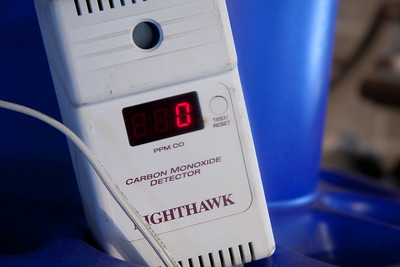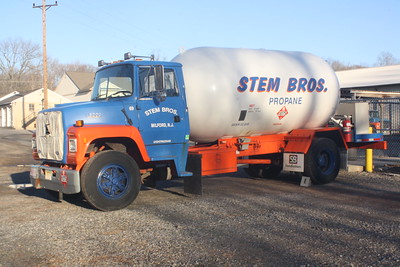
A carbon monoxide (CO) detector is not designed to detect propane gas. CO detectors are specifically calibrated to sense and respond to the presence of carbon monoxide, which is a byproduct of the incomplete combustion of fossil fuels. On the other hand, propane is a hydrocarbon gas (C3H8), and it requires a different type of sensor to be detected.
Carbon monoxide and propane gases have different chemical properties and behave differently in the air. CO is slightly lighter than air and can mix well throughout the room, whereas propane is heavier than air and tends to accumulate at the floor level. Because of these differences, the sensors required to determine these gases are designed to determine their specific physical and chemical properties.
Propane detectors use sensors that are responsive to the gaseous compounds of propane. They are often catalytic or use semiconductor sensors that can recognize a broad range of combustible gases. Some combination detectors are available on the market that can recognize both carbon monoxide and explosive gases like propane and natural gas, but these are specifically labeled as such.
Therefore, it is important not to rely on a CO detector to warn of propane leaks. Instead, it is recommended to install combination models or a separate propane detector, especially in environments where propane is used for heating or cooking, to ensure proper safety from propane gas leaks. Regular maintenance and testing of these devices are also crucial to ensure they are functioning correctly.
The Right Tool for the Job
Propane detectors are devices specifically designed to recognize the presence of propane gas in the environment. Unlike carbon monoxide detectors, which measure the concentration of CO in the air, these devices are calibrated to sense the propane’s hydrocarbon molecules. Here’s how they generally work:
- Propane models often use one of two types of sensors:
- Catalytic Sensors: These sensors burn the gas and measure the heat produced to determine the concentration of a gas like propane.
- Infrared Sensors: These sensors use the specific absorption wavelength of propane to find out its presence without burning it.
- When propane leaks and its concentration reaches a certain threshold, the device’s sensor triggers an electronic reaction. This reaction activates an alarm system, which can be both audible and visual, alerting occupants to the presence of gas.
- Propane being heavier than air, propane detectors are typically placed low to the ground, to recognize the gas before it reaches a dangerous concentration.
Benefits of Installing Propane-Specific Detectors
The installation of propane-specific devices in homes and businesses that utilize propane for heating or cooking offers several key benefits:
- Prevention of Explosions and Fires: Propane detectors can alert occupants to leaks that, if left unnoticed, could result in explosions or fires.
- Health Protection: Prolonged exposure to propane can have negative health effects. Early recognition ensures that individuals can vacate the premises to avoid these risks.
- Peace of Mind: Knowing that you have a system in place that will alert you to propane leaks can provide significant peace of mind, especially in settings where propane is used extensively.
- Insurance Benefits: Some insurers may offer discounts or preferential terms for properties equipped with gas detectors.
Integration of Propane Detectors with CO Detectors for Safety
For a holistic approach to gas safety, integrating propane detectors with CO detectors is recommended:
- Dual-Function Models: Some modern devices are designed to monitor both CO and propane. These combination devices can be an economical and space-saving solution for comprehensive gas recognition.
- Interconnected Systems: Some systems allow for various types of devices to be interconnected, so when one device goes off, all alarms throughout the property are triggered, ensuring that the warning is heard regardless of one’s location in the property.
- Smart Technology Integration: Advanced devices can also be integrated into smart home systems, sending alerts to your mobile devices and allowing for remote monitoring of your home’s safety.
While CO detectors are crucial for monitoring the presence of carbon monoxide, propane detectors are equally important for recognizing the presence of propane gas. Using both types or a combination ensures complete protection against the risks associated with these different gases. Regular maintenance and proper placement of these devices are key to ensuring they work effectively to provide a safe living or working environment.
Detection of Propane
Sensory Requirements for Monitoring Propane Gas
- Type of Sensor: Propane detectors generally utilize catalytic and infrared sensors which are specifically designed to recognize the chemical structure and properties of propane.
- Sensitivity: The sensor must be sensitive enough to determine low levels of propane before it reaches the lower explosive limit (LEL), which is approximately 2.1% of the gas in the air.
- Calibration: Propane sensors must be calibrated to the specific gas they are intended to recognize, ensuring accuracy and reducing false alarms.
- Response Time: Rapid detection is crucial for safety, so the sensors must have a quick response time to allow for immediate action.
The Difference between CO and Propane Detectors
- Target Gas: CO detectors are designed only for carbon monoxide using electrochemical cells, while propane models often use catalytic or infrared sensors suitable for monitoring hydrocarbons.
- Sensor Operation: CO sensors work by measuring the electrical currents generated by the chemical reaction of carbon monoxide on the sensor, whereas propane types typically rely on burning the gas (catalytic) or measuring the absorption of infrared light (infrared).
Challenges
- Chemical Differences: Propane (C3H8) and carbon monoxide (CO) are chemically distinct, meaning that the sensors designed for identifying CO will not typically recognize propane molecules.
- Sensitivity and Specificity: CO models are not sensitive to the larger hydrocarbon molecules of propane. They are specifically calibrated to identify the presence of CO only.
- Alarm Thresholds: The alarm thresholds are different for the two gases, so even if a CO detector could recognize propane, it would not alarm at the appropriate concentration levels.
- Sensor Technology Limitations: The electrochemical technology in CO detectors is not effective for the recognition of hydrocarbon-based gases like propane.
- False Sense of Security: Using a CO detector to monitor propane leaks can lead to a false sense of security, as the device may not respond to propane accumulation, potentially leading to dangerous situations.
While both types are vital safety devices, they operate on different principles and are intended for different purposes. It is important to have the appropriate type installed for the specific gas you need to monitor to ensure the safety and well-being of occupants within any enclosed space.
What to do if You Suspect Carbon Monoxide Poisoning
If you suspect you or someone else may be experiencing carbon monoxide poisoning, you should remove yourself from the area immediately and call 911. If you are unable to leave the area, open doors and windows to try and ventilate the space.
If the person is unconscious, call for medical help and do not attempt to move them. If you are with more than one person, have someone else call for help while you stay with the person. Symptoms of carbon monoxide poisoning include headache, dizziness, nausea, vomiting, confusion, and chest pain. If you experience any of these symptoms, seek medical attention immediately.
Safety Recommendations
A. Best Practices for Installing the Device in Homes and Businesses
- Correct Placement: Install CO detectors near sleeping areas and on every floor of the home or business. Propane detectors should be placed near potential sources of leaks, such as furnaces, stoves, or water heaters, and because propane is heavier than air, they should be installed low to the ground.
- Follow Manufacturer Instructions: Always follow the installation instructions provided by the manufacturer, which include details on height and location relative to gas appliances and ventilation.
- Avoid Obstructions: Ensure that the devices are not obstructed by furniture or draperies and are placed away from windows or doors that could affect their operation.
- Consider Ventilation Areas: Keep the devices out of areas with high ventilation, as drafts can dilute gas concentrations and lead to false negatives.
- Interconnected Alarms: Use interconnected gas detectors that will activate all alarms in the building if one finds hazardous levels of gas, ensuring everyone is alerted.
- Integration with Security Systems: For businesses, integrating gas detectors with the building’s security or automation system can provide remote monitoring and alerts to building management or emergency services.
B. Emergency Response to Gas Leak Indications
- Immediate Evacuation: If the alarm sounds, do not attempt to locate the source of the leak. Evacuate the building immediately, making sure to alert others in the building as you leave.
- Avoid Sparks: Do not switch on or off any electrical appliances or lights, as this could ignite the gas.
- Call Emergency Services: Once safely outside, call the fire department or emergency services. Use a neighbor’s phone or a cell phone at a safe distance from the house.
- Do Not Re-enter: Do not go back into the building until it has been declared safe by the emergency responders.
- Gas Supply Shut Off: If you know how and can do it safely, shut off the main gas supply valve to prevent more gas from leaking.
C. Regular Maintenance and Testing
- Test Regularly: Test your devices monthly by pressing the test button to ensure they are operating properly.
- Replace Batteries: If your detectors are battery-operated, replace the batteries at least once a year, or as recommended by the manufacturer.
- Keep them Clean: Dust and debris can affect their sensitivity, so vacuum around the devices regularly to prevent build-up.
- Scheduled Inspections: Have a qualified technician conduct regular inspections of your gas appliances and detectors to ensure they are in good working order.
- Observe End-of-Life Signals: Most models will signal when they need to be replaced (typically after 5-10 years). Heed these signals promptly to ensure continuous protection.
- Keep Records: Maintain a log of tests, battery replacements, and maintenance activities, especially for businesses, to ensure compliance with safety regulations.
By following these safety recommendations, individuals and businesses can enhance their preparedness for gas-related hazards and ensure a safer environment for occupants and property alike.
Maintaining the Device
Maintaining the device, whether for carbon monoxide, propane, or other gases, is essential to ensure it functions correctly and provides the necessary protection. Here is a guide on how to maintain these detectors:
Regular Testing
- Test Functionality: Use the test button on the detector to check its functionality. This should be done monthly.
- Simulated Gas Tests: For some types and models, especially in industrial settings, simulated gas tests using a test gas can be conducted to ensure the sensor responds to the gas it is meant to recognize.
Battery Replacement and Power Supply Check
- Battery Life: Replace batteries annually, or as soon as the low-battery signal appears. Some models may use batteries that have a longer life, so always refer to the manufacturer’s guidelines.
- Hardwired Systems: If the device is hardwired, ensure the electrical circuit is checked and that there is a battery backup in case of a power outage.
Cleaning
- Dust and Debris: Regularly dust the unit with a soft brush attachment on a vacuum cleaner. Avoid using water, cleaners, or solvents, which could damage the sensor.
- Insects and Cobwebs: Clear away any insects, cobwebs, or other blockages that could prevent the gas from reaching the sensor.
Sensor and Circuitry Checks
- Sensor Replacement: Some models have replaceable sensors. Check the manufacturer’s instructions for the recommended replacement interval.
- Circuit Check: For certain models, especially those used in industrial applications, regular circuit checks may be necessary to ensure the electronic components are functioning properly.
Environmental Considerations
- Location: Ensure the device is not exposed to extreme temperatures, humidity, or direct sunlight, which can affect its performance.
- Chemicals: Keep the device away from solvents and cleaners that could deteriorate its sensor.
Professional Inspection
- Annual Checks: Have the device inspected by a professional annually, particularly for systems used in business or industrial environments.
- Calibration: Some gas detectors require regular calibration with specific gases to ensure accuracy. This should be done according to the manufacturer’s specifications.
Record Keeping
- Maintenance Log: Keep a maintenance log that records every test, battery replacement, cleaning, and professional inspection. This is especially important for businesses and landlords who have legal responsibilities to ensure the safety of their tenants or employees.
Replacement
- End-of-Life: Gas detectors do not last forever. They should be replaced every 5-10 years depending on the manufacturer’s recommendations. Many units will have an end-of-life warning signal.
By regularly maintaining gas detectors, you can help protect your home or workplace from potentially dangerous gas leaks and ensure that your safety systems are always operating effectively.
Consulting a Qualified Technician
When it comes to ensuring the proper function and maintenance of gas detectors, be it for carbon monoxide, propane, or other hazardous gases, consulting a qualified technician is a critical step. Here’s an overview of why professional expertise is indispensable:
Importance of Expertise
- Professional Knowledge: Qualified technicians have specialized knowledge and are trained to handle gas detection equipment correctly.
- Accurate Installation: A technician can ensure that detectors are installed in optimal locations to provide reliable monitoring.
- Calibration and Testing: Technicians can perform necessary calibrations and functional tests that may be beyond the capability of the average user.
- Troubleshooting: Professionals can effectively troubleshoot and repair any issues, thereby preventing potential safety hazards.
When to Consult a Technician
- Initial Setup: When first installing the devices, a technician can advise on the best type and placement for your specific needs.
- Routine Maintenance: For annual checks or manufacturer-recommended servicing intervals.
- Performance Issues: If a device is not functioning as expected or has signaled a fault condition.
- After an Alarm Event: Post-alarm evaluations to inspect and reset the device, and to investigate the cause of the alarm.
Finding the Right Technician
- Certifications: Look for technicians with certifications in gas detection and any specific qualifications relevant to your type of device.
- Experience: Experienced technicians are more likely to provide accurate and reliable service.
- Manufacturer Affiliation: Choosing a technician affiliated with or recommended by the manufacturer ensures that they are familiar with the specific equipment.
Benefits of Regular Technician Visits
- Safety Assurance: Regular servicing ensures that the devices are always ready to perform in case of a gas leak.
- Regulatory Compliance: For businesses, regular checks by a qualified technician may be part of regulatory compliance.
- Extended Equipment Life: Proper maintenance can prolong the life of your gas monitoring equipment.
Consulting a qualified technician for the installation, maintenance, and servicing of gas detectors is essential for ensuring they function correctly and reliably. This expertise is not only a matter of performance but also of safety, compliance, and peace of mind. By investing in professional services, you can trust that your detectors will operate effectively and alert you in time to prevent a potential tragedy.
In conclusion
For safety, it’s vital to recognize that carbon monoxide (CO) and propane sensing devices are tailored for different hazards due to the unique properties of these gases. Devices designed for CO will not sense propane, indicating that any space utilizing propane requires dedicated sensing equipment for this gas, along with CO monitors.
Proper upkeep of these devices is crucial, encompassing routine checks, prompt battery updates, and compliance with the manufacturer’s installation and service instructions. Accurate and appropriate technology is essential for the detection of specific gases, safeguarding individuals and premises. Trusting a CO monitor to alert for propane presence is risky and can provide a deceptive sense of security.
For optimal protection, it’s necessary to deploy both types of monitoring where needed, conduct careful maintenance, and be prepared with correct alarm response actions. Taking these proactive steps is fundamental in reducing the hazards these gases pose.

Mike is an experienced propane technician with over 15 years of professional experience in the field. He has dedicated his career to helping customers with their propane needs, from installation to maintenance and repair. Together with Jeremy, he co-founded this website to provide useful information and guidance to customers seeking reliable propane services.



